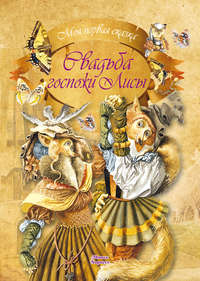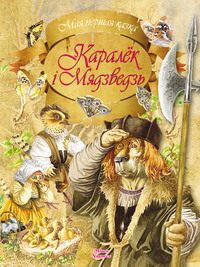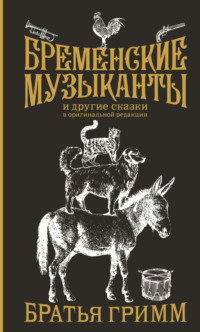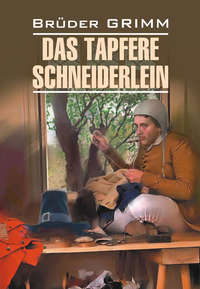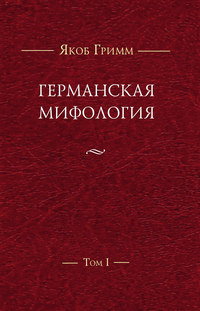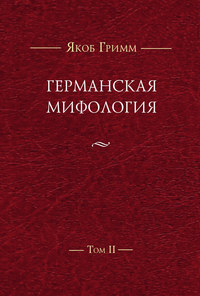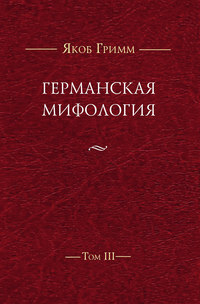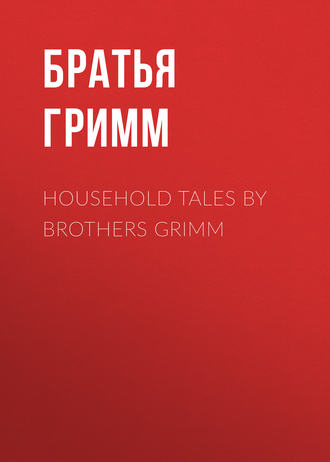 полная версия
полная версияHousehold Tales by Brothers Grimm
Now it so happened that on this very day the Queen lost her most beautiful ring, and suspicion of having stolen it fell upon this trusty servant, who was allowed to go everywhere. The King ordered the man to be brought before him, and threatened with angry words that unless he could before the morrow point out the thief, he himself should be looked upon as guilty and executed. In vain he declared his innocence; he was dismissed with no better answer.
In his trouble and fear he went down into the courtyard and took thought how to help himself out of his trouble. Now some ducks were sitting together quietly by a brook and taking their rest; and, whilst they were making their feathers smooth with their bills, they were having a confidential conversation together. The servant stood by and listened. They were telling one another of all the places where they had been waddling about all the morning, and what good food they had found, and one said in a pitiful tone, "Something lies heavy on my stomach; as I was eating in haste I swallowed a ring which lay under the Queen's window." The servant at once seized her by the neck, carried her to the kitchen, and said to the cook, "Here is a fine duck; pray, kill her." "Yes," said the cook, and weighed her in his hand; "she has spared no trouble to fatten herself, and has been waiting to be roasted long enough." So he cut off her head, and as she was being dressed for the spit, the Queen's ring was found inside her.
The servant could now easily prove his innocence; and the King, to make amends for the wrong, allowed him to ask a favor, and promised him the best place in the court that he could wish for. The servant refused everything, and only asked for a horse and some money for traveling, as he had a mind to see the world and go about a little.
When his request was granted he set out on his way, and one day came to a pond, where he saw three fishes caught in the reeds and gasping for water. Now, though it is said that fishes are dumb, he heard them lamenting that they must perish so miserably, and, as he had a kind heart, he got off his horse and put the three prisoners back into the water. They quivered with delight, put out their heads, and cried to him, "We will remember you and repay you for saving us!"
He rode on, and after a while it seemed to him that he heard a voice in the sand at his feet. He listened, and heard an ant-king complain, "Why cannot folks, with their clumsy beasts, keep off our bodies? That stupid horse, with his heavy hoofs, has been treading down my people without mercy!" So he turned on to a side path and the ant-king cried out to him, "We will remember you – one good turn deserves another!"
The path led him into a wood, and here he saw two old ravens standing by their nest, and throwing out their young ones. "Out with you, you idle, good-for-nothing creatures!" cried they; "we cannot find food for you any longer; you are big enough, and can provide for yourselves." But the poor young ravens lay upon the ground, flapping their wings, and crying, "Oh, what helpless chicks we are! We must shift for ourselves, and yet we cannot fly! What can we do, but lie here and starve?" So the good young fellow alighted and killed his horse with his sword, and gave it to them for food. Then they came hopping up to it, satisfied their hunger, and cried, "We will remember you – one good turn deserves another!"
And now he had to use his own legs, and when he had walked a long way, he came to a large city. There was a great noise and crowd in the streets, and a man rode up on horseback, crying aloud, "The King's daughter wants a husband; but whoever sues for her hand must perform a hard task, and if he does not succeed he will forfeit his life." Many had already made the attempt, but in vain; nevertheless when the youth saw the King's daughter he was so overcome by her great beauty that he forgot all danger, went before the King, and declared himself a suitor.
So he was led out to the sea, and a gold ring was thrown into it, in his sight; then the King ordered him to fetch this ring up from the bottom of the sea, and added, "If you come up again without it you will be thrown in again and again until you perish amid the waves." All the people grieved for the handsome youth; then they went away, leaving him alone by the sea.
He stood on the shore and considered what he should do, when suddenly he saw three fishes come swimming towards him, and they were the very fishes whose lives he had saved. The one in the middle held a mussel in its mouth, which it laid on the shore at the youth's feet, and when he had taken it up and opened it, there lay the gold ring in the shell. Full of joy he took it to the King, and expected that he would grant him the promised reward.
But when the proud princess perceived that he was not her equal in birth, she scorned him, and required him first to perform another task. She went down into the garden and strewed with her own hands ten sacks-full of millet-seed on the grass; then she said, "To-morrow morning before sunrise these must be picked up, and not a single grain be wanting."
The youth sat down in the garden and considered how it might be possible to perform this task, but he could think of nothing, and there he sat sorrowfully awaiting the break of day, when he should be led to death. But as soon as the first rays of the sun shone into the garden he saw all the ten sacks standing side by side, quite full, and not a single grain was missing. The ant-king had come in the night with thousands and thousands of ants, and the grateful creatures had by great industry picked up all the millet-seed and gathered them into the sacks.
Presently the King's daughter herself came down into the garden, and was amazed to see that the young man had done the task she had given him. But she could not yet conquer her proud heart, and said, "Although he has performed both the tasks, he shall not be my husband until he has brought me an apple from the Tree of Life."
The youth did not know where the Tree of Life stood, but he set out, and would have gone on for ever, as long as his legs would carry him, though he had no hope of finding it. After he had wandered through three kingdoms, he came one evening to a wood, and lay down under a tree to sleep. But he heard a rustling in the branches, and a golden apple fell into his hand. At the same time three ravens flew down to him, perched themselves upon his knee, and said, "We are the three young ravens whom you saved from starving; when we had grown big, and heard that you were seeking the Golden Apple, we flew over the sea to the end of the world, where the Tree of Life stands, and have brought you the apple." The youth, full of joy, set out homewards, and took the Golden Apple to the King's beautiful daughter, who had no more excuses left to make. They cut the Apple of Life in two and ate it together; and then her heart became full of love for him, and they lived in undisturbed happiness to a great age.
18 The Straw, the Coal, and the Bean
In a village dwelt a poor old woman, who had gathered together a dish of beans and wanted to cook them. So she made a fire on her hearth, and that it might burn the quicker, she lighted it with a handful of straw. When she was emptying the beans into the pan, one dropped without her observing it, and lay on the ground beside a straw, and soon afterwards a burning coal from the fire leapt down to the two. Then the straw began and said, "Dear friends, from whence do you come here?" The coal replied, "I fortunately sprang out of the fire, and if I had not escaped by main force, my death would have been certain, – I should have been burnt to ashes." The bean said, "I too have escaped with a whole skin, but if the old woman had got me into the pan, I should have been made into broth without any mercy, like my comrades." "And would a better fate have fallen to my lot?" said the straw. "The old woman has destroyed all my brethren in fire and smoke; she seized sixty of them at once, and took their lives. I luckily slipped through her fingers."
"But what are we to do now?" said the coal.
"I think," answered the bean, "that as we have so fortunately escaped death, we should keep together like good companions, and lest a new mischance should overtake us here, we should go away together, and repair to a foreign country."
The proposition pleased the two others, and they set out on their way in company. Soon, however, they came to a little brook, and as there was no bridge or foot-plank, they did not know how they were to get over it. The straw hit on a good idea, and said, "I will lay myself straight across, and then you can walk over on me as on a bridge." The straw therefore stretched itself from one bank to the other, and the coal, who was of an impetuous disposition, tripped quite boldly on to the newly-built bridge. But when she had reached the middle, and heard the water rushing beneath her, she was, after all, afraid, and stood still, and ventured no farther. The straw, however, began to burn, broke in two pieces, and fell into the stream. The coal slipped after her, hissed when she got into the water, and breathed her last. The bean, who had prudently stayed behind on the shore, could not but laugh at the event, was unable to stop, and laughed so heartily that she burst. It would have been all over with her, likewise, if, by good fortune, a tailor who was traveling in search of work, had not sat down to rest by the brook. As he had a compassionate heart he pulled out his needle and thread, and sewed her together. The bean thanked him most prettily, but as the tailor used black thread, all beans since then have a black seam.
19 The Fisherman and His Wife
There was once on a time a Fisherman who lived with his wife in a miserable hovel close by the sea, and every day he went out fishing. And once as he was sitting with his rod, looking at the clear water, his line suddenly went down, far down below, and when he drew it up again he brought out a large Flounder. Then the Flounder said to him, "Hark, you Fisherman, I pray you, let me live, I am no Flounder really, but an enchanted prince. What good will it do you to kill me? I should not be good to eat, put me in the water again, and let me go." "Come," said the Fisherman, "there is no need for so many words about it – a fish that can talk I should certainly let go, anyhow," with that he put him back again into the clear water, and the Flounder went to the bottom, leaving a long streak of blood behind him. Then the Fisherman got up and went home to his wife in the hovel.
"Husband," said the woman, "have you caught nothing to-day?" "No," said the man, "I did catch a Flounder, who said he was an enchanted prince, so I let him go again." "Did you not wish for anything first?" said the woman. "No," said the man; "what should I wish for?" "Ah," said the woman, "it is surely hard to have to live always in this dirty hovel; you might have wished for a small cottage for us. Go back and call him. Tell him we want to have a small cottage, he will certainly give us that." "Ah," said the man, "why should I go there again?" "Why," said the woman, "you did catch him, and you let him go again; he is sure to do it. Go at once." The man still did not quite like to go, but did not like to oppose his wife, and went to the sea.
When he got there the sea was all green and yellow, and no longer so smooth; so he stood still and said,
"Flounder, flounder in the sea, Come, I pray thee, here to me; For my wife, good Ilsabil, Wills not as I'd have her will."Then the Flounder came swimming to him and said, "Well what does she want, then?" "Ah," said the man, "I did catch you, and my wife says I really ought to have wished for something. She does not like to live in a wretched hovel any longer. She would like to have a cottage." "Go, then," said the Flounder, "she has it already."
When the man went home, his wife was no longer in the hovel, but instead of it there stood a small cottage, and she was sitting on a bench before the door. Then she took him by the hand and said to him, "Just come inside, look, now isn't this a great deal better?" So they went in, and there was a small porch, and a pretty little parlor and bedroom, and a kitchen and pantry, with the best of furniture, and fitted up with the most beautiful things made of tin and brass, whatsoever was wanted. And behind the cottage there was a small yard, with hens and ducks, and a little garden with flowers and fruit. "Look," said the wife, "is not that nice!" "Yes," said the husband, "and so we must always think it, – now we will live quite contented." "We will think about that," said the wife. With that they ate something and went to bed.
Everything went well for a week or a fortnight, and then the woman said, "Hark you, husband, this cottage is far too small for us, and the garden and yard are little; the Flounder might just as well have given us a larger house. I should like to live in a great stone castle; go to the Flounder, and tell him to give us a castle." "Ah, wife," said the man, "the cottage is quite good enough; why should we live in a castle?" "What!" said the woman; "just go there, the Flounder can always do that." "No, wife," said the man, "the Flounder has just given us the cottage, I do not like to go back so soon, it might make him angry." "Go," said the woman, "he can do it quite easily, and will be glad to do it; just you go to him."
The man's heart grew heavy, and he would not go. He said to himself, "It is not right," and yet he went. And when he came to the sea the water was quite purple and dark-blue, and grey and thick, and no longer so green and yellow, but it was still quiet. And he stood there and said —
"Flounder, flounder in the sea, Come, I pray thee, here to me; For my wife, good Ilsabil, Wills not as I'd have her will.""Well, what does she want, then?" said the Flounder. "Alas," said the man, half scared, "she wants to live in a great stone castle." "Go to it, then, she is standing before the door," said the Flounder.
Then the man went away, intending to go home, but when he got there, he found a great stone palace, and his wife was just standing on the steps going in, and she took him by the hand and said, "Come in." So he went in with her, and in the castle was a great hall paved with marble, and many servants, who flung wide the doors; And the walls were all bright with beautiful hangings, and in the rooms were chairs and tables of pure gold, and crystal chandeliers hung from the ceiling, and all the rooms and bed-rooms had carpets, and food and wine of the very best were standing on all the tables, so that they nearly broke down beneath it. Behind the house, too, there was a great court-yard, with stables for horses and cows, and the very best of carriages; there was a magnificent large garden, too, with the most beautiful flowers and fruit-trees, and a park quite half a mile long, in which were stags, deer, and hares, and everything that could be desired. "Come," said the woman, "isn't that beautiful?" "Yes, indeed," said the man, "now let it be; and we will live in this beautiful castle and be content." "We will consider about that," said the woman, "and sleep upon it;" thereupon they went to bed.
Next morning the wife awoke first, and it was just daybreak, and from her bed she saw the beautiful country lying before her. Her husband was still stretching himself, so she poked him in the side with her elbow, and said, "Get up, husband, and just peep out of the window. Look you, couldn't we be the King over all that land? Go to the Flounder, we will be the King." "Ah, wife," said the man, "why should we be King? I do not want to be King." "Well," said the wife, "if you won't be King, I will; go to the Flounder, for I will be King." "Ah, wife," said the man, "why do you want to be King? I do not like to say that to him." "Why not?" said the woman; "go to him this instant; I must be King!" So the man went, and was quite unhappy because his wife wished to be King. "It is not right; it is not right," thought he. He did not wish to go, but yet he went.
And when he came to the sea, it was quite dark-grey, and the water heaved up from below, and smelt putrid. Then he went and stood by it, and said,
"Flounder, flounder in the sea, Come, I pray thee, here to me; For my wife, good Ilsabil, Wills not as I'd have her will""Well, what does she want, then?" said the Flounder. "Alas," said the man, "she wants to be King." "Go to her; she is King already."
So the man went, and when he came to the palace, the castle had become much larger, and had a great tower and magnificent ornaments, and the sentinel was standing before the door, and there were numbers of soldiers with kettle-drums and trumpets. And when he went inside the house, everything was of real marble and gold, with velvet covers and great golden tassels. Then the doors of the hall were opened, and there was the court in all its splendour, and his wife was sitting on a high throne of gold and diamonds, with a great crown of gold on her head, and a sceptre of pure gold and jewels in her hand, and on both sides of her stood her maids-in-waiting in a row, each of them always one head shorter than the last.
Then he went and stood before her, and said, "Ah, wife, and now you are King." "Yes," said the woman, "now I am King." So he stood and looked at her, and when he had looked at her thus for some time, he said, "And now that you are King, let all else be, now we will wish for nothing more." "Nay, husband," said the woman, quite anxiously, "I find time pass very heavily, I can bear it no longer; go to the Flounder – I am King, but I must be Emperor, too." "Alas, wife, why do you wish to be Emperor?" "Husband," said she, "go to the Flounder. I will be Emperor." "Alas, wife," said the man, "he cannot make you Emperor; I may not say that to the fish. There is only one Emperor in the land. An Emperor the Flounder cannot make you! I assure you he cannot."
"What!" said the woman, "I am the King, and you are nothing but my husband; will you go this moment? go at once! If he can make a King he can make an emperor. I will be Emperor; go instantly." So he was forced to go. As the man went, however, he was troubled in mind, and thought to himself, "It will not end well; it will not end well! Emperor is too shameless! The Flounder will at last be tired out."
With that he reached the sea, and the sea was quite black and thick, and began to boil up from below, so that it threw up bubbles, and such a sharp wind blew over it that it curdled, and the man was afraid. Then he went and stood by it, and said,
"Flounder, flounder in the sea, Come, I pray thee, here to me; For my wife, good Ilsabil, Wills not as I'd have her will.""Well, what does she want, then?" said the Flounder. "Alas, Flounder," said he, "my wife wants to be Emperor." "Go to her," said the Flounder; "she is Emperor already."
So the man went, and when he got there the whole palace was made of polished marble with alabaster figures and golden ornaments, and soldiers were marching before the door blowing trumpets, and beating cymbals and drums; and in the house, barons, and counts, and dukes were going about as servants. Then they opened the doors to him, which were of pure gold. And when he entered, there sat his wife on a throne, which was made of one piece of gold, and was quite two miles high; and she wore a great golden crown that was three yards high, and set with diamonds and carbuncles, and in one hand she had the sceptre, and in the other the imperial orb; and on both sides of her stood the yeomen of the guard in two rows, each being smaller than the one before him, from the biggest giant, who was two miles high, to the very smallest dwarf, just as big as my little finger. And before it stood a number of princes and dukes.
Then the man went and stood among them, and said, "Wife, are you Emperor now?" "Yes," said she, "now I am Emperor." Then he stood and looked at her well, and when he had looked at her thus for some time, he said, "Ah, wife, be content, now that you are Emperor." "Husband," said she, "why are you standing there? Now, I am Emperor, but I will be Pope too; go to the Flounder." "Alas, wife," said the man, "what will you not wish for? You cannot be Pope. There is but one in Christendom. He cannot make you Pope." "Husband," said she, "I will be Pope; go immediately, I must be Pope this very day." "No, wife," said the man, "I do not like to say that to him; that would not do, it is too much; the Flounder can't make you Pope." "Husband," said she, "what nonsense! If he can make an emperor he can make a pope. Go to him directly. I am Emperor, and you are nothing but my husband; will you go at once?"
Then he was afraid and went; but he was quite faint, and shivered and shook, and his knees and legs trembled. And a high wind blew over the land, and the clouds flew, and towards evening all grew dark, and the leaves fell from the trees, and the water rose and roared as if it were boiling, and splashed upon the shore. And in the distance he saw ships which were firing guns in their sore need, pitching and tossing on the waves. And yet in the midst of the sky there was still a small bit of blue, though on every side it was as red as in a heavy storm. So, full of despair, he went and stood in much fear and said,
"Flounder, flounder in the sea, Come, I pray thee, here to me;" For my wife, good Ilsabil, Wills not as I'd have her will.
"Well, what does she want, then?" said the Flounder. "Alas," said the man, "she wants to be Pope." "Go to her then," said the Flounder; "she is Pope already."
So he went, and when he got there, he saw what seemed to be a large church surrounded by palaces. He pushed his way through the crowd. Inside, however, everything was lighted up with thousands and thousands of candles, and his wife was clad in gold, and she was sitting on a much higher throne, and had three great golden crowns on, and round about her there was much ecclesiastical splendour; and on both sides of her was a row of candles the largest of which was as tall as the very tallest tower, down to the very smallest kitchen candle, and all the emperors and kings were on their knees before her, kissing her shoe. "Wife," said the man, and looked attentively at her, "are you now Pope?" "Yes," said she, "I am Pope." So he stood and looked at her, and it was just as if he was looking at the bright sun. When he had stood looking at her thus for a short time, he said, "Ah, wife, if you are Pope, do let well alone!" But she looked as stiff as a post, and did not move or show any signs of life. Then said he, "Wife, now that you are Pope, be satisfied, you cannot become anything greater now." "I will consider about that," said the woman. Thereupon they both went to bed, but she was not satisfied, and greediness let her have no sleep, for she was continually thinking what there was left for her to be.
The man slept well and soundly, for he had run about a great deal during the day; but the woman could not fall asleep at all, and flung herself from one side to the other the whole night through, thinking always what more was left for her to be, but unable to call to mind anything else. At length the sun began to rise, and when the woman saw the red of dawn, she sat up in bed and looked at it. And when, through the window, she saw the sun thus rising, she said, "Cannot I, too, order the sun and moon to rise?" "Husband," she said, poking him in the ribs with her elbows, "wake up! go to the Flounder, for I wish to be even as God is." The man was still half asleep, but he was so horrified that he fell out of bed. He thought he must have heard amiss, and rubbed his eyes, and said, "Alas, wife, what are you saying?" "Husband," said she, "if I can't order the sun and moon to rise, and have to look on and see the sun and moon rising, I can't bear it. I shall not know what it is to have another happy hour, unless I can make them rise myself." Then she looked at him so terribly that a shudder ran over him, and said, "Go at once; I wish to be like unto God." "Alas, wife," said the man, falling on his knees before her, "the Flounder cannot do that; he can make an emperor and a pope; I beseech you, go on as you are, and be Pope." Then she fell into a rage, and her hair flew wildly about her head, and she cried, "I will not endure this, I'll not bear it any longer; wilt thou go?" Then he put on his trousers and ran away like a madman. But outside a great storm was raging, and blowing so hard that he could scarcely keep his feet; houses and trees toppled over, the mountains trembled, rocks rolled into the sea, the sky was pitch black, and it thundered and lightened, and the sea came in with black waves as high as church-towers and mountains, and all with crests of white foam at the top. Then he cried, but could not hear his own words,


